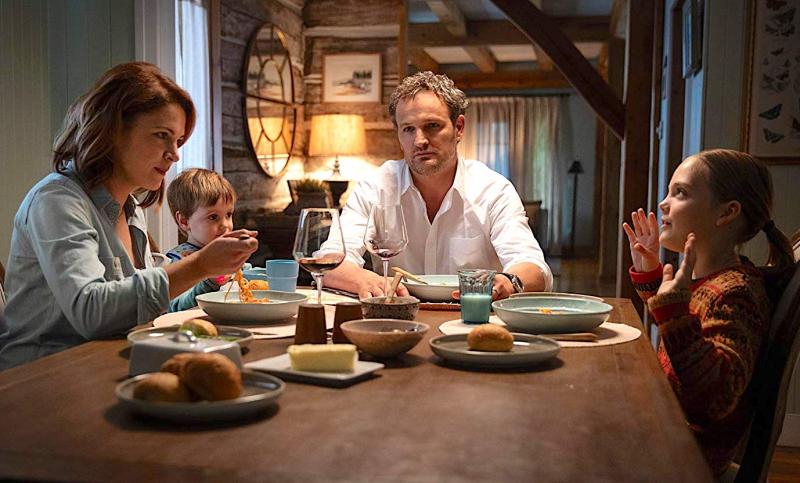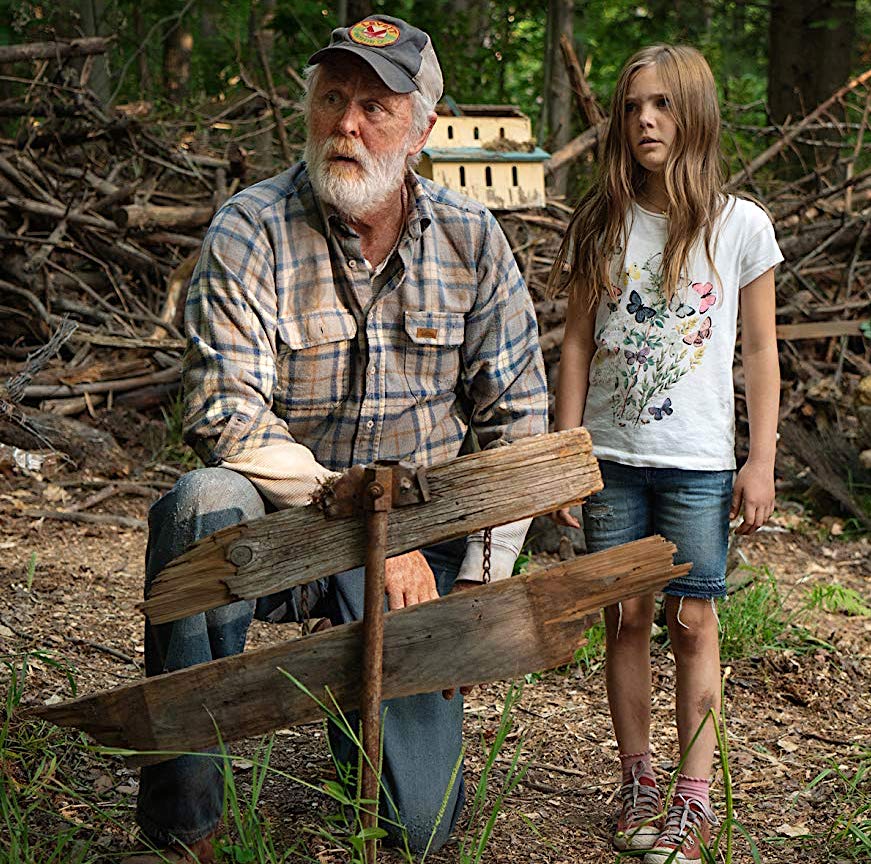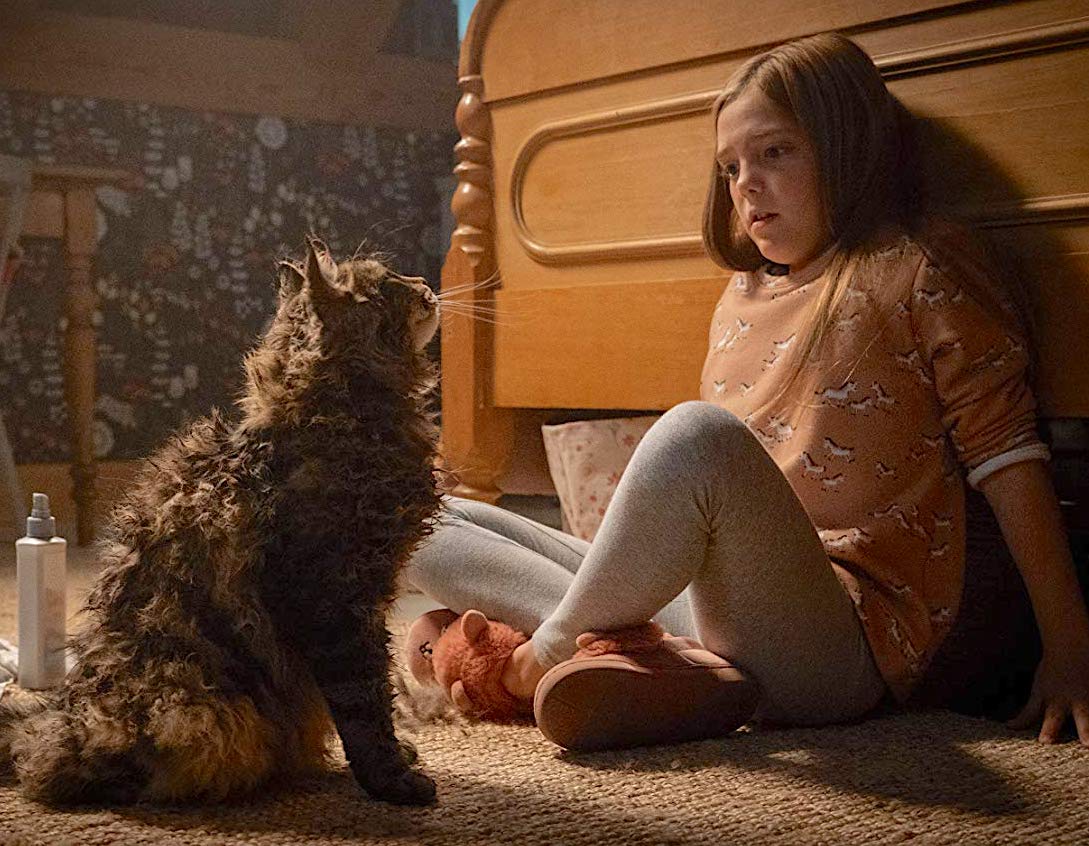Pet Sematary review - spine-jolting shocks, but a disappointing ending | reviews, news & interviews
Pet Sematary review - spine-jolting shocks, but a disappointing ending
Pet Sematary review - spine-jolting shocks, but a disappointing ending
Stephen King adaptation leaves you pondering what might have been

The wilds of Maine have been favourite country for novelist Stephen King, and they form the setting for this new version of his 1983 supernatural thriller (previously filmed in 1989).
It all looks promising as the Creeds drive through winding, leafy lanes and admire the sprawling 50 acres surrounding their new abode. There’s a sudden menacing note, though, as the rural peace is shattered by a giant truck roaring by at colossal speed. Stranger still is the procession of children wearing weird animal masks which treks past, pushing a dead dog in a wheelbarrow.
 Wandering in the forest, Creed’s daughter Ellie (Jeté Laurence) finds the lush woodland giving way to a wasteland of stunted trees, crosses and piles of twisted logs. Here she meets Jud Crandall (John Lithgow, pictured right with Laurence), a mysterious old-timer who tells her about the old local tradition of bringing dead pets here to be buried.
Wandering in the forest, Creed’s daughter Ellie (Jeté Laurence) finds the lush woodland giving way to a wasteland of stunted trees, crosses and piles of twisted logs. Here she meets Jud Crandall (John Lithgow, pictured right with Laurence), a mysterious old-timer who tells her about the old local tradition of bringing dead pets here to be buried.
King’s theme is life, death and bereavement, and why it’s better for the dead to stay that way. It’s Jud who lets the cat out of the bag, telling Louis that the Pet Sematary is the seat of ancient powers which can bring the dead back to life (“there’s something up there...”) There’s talk of the Wendigo, an evil spirit from Algonquin folklore. The first manifestation of ancestral weirdness is the freakish reincarnation of Church, Ellie’s pet moggie (pictured below), a scruffily amiable creature before he gets run over, only to return as a hissing, scratching monster.
Directed by Kevin Kölsch and Dennis Widmyer, Pet Sematary delivers some chilling shocks and spine-jolting scares, and it works best when it keeps the story’s supernatural dimension connected to the real-life experiences of the protagonists. Creed and his wife Rachel (Amy Seimetz) discuss the afterlife with daughter Ellie (Jeté Laurence) – Rachel, a religious believer, is confident there is one, but Louis the science-based medic says there isn’t. Rachel’s outlook is rooted in guilt about her childhood experiences with her sister Zelda, who suffered a hideous spinal deformity (ghoulishly exaggerated here by props and makeup). Louis finds his belief in empirical evidence challenged after he tries unsuccessfully to save a local boy, horrifically injured in a road accident, and finds the victim appearing to him in dreams, warning him that “the barrier is broken”.
 It’s a sudden tragic bereavement which sets up the denouement. The family’s pain and loss is crushing, and the doc’s desire to turn back time understandable, but his sudden conversion from rational professional to occult gravedigger is a little too much of a leap. As the story parts company with the emotional life of its characters it devolves into a catalogue of splatter-fest commonplaces, almost as if a different production crew has taken over. The ending arrives with indecent haste, as though the cinema management has suddenly decided they need the room back and want the audience out pronto. It leaves you pondering what might have been.
It’s a sudden tragic bereavement which sets up the denouement. The family’s pain and loss is crushing, and the doc’s desire to turn back time understandable, but his sudden conversion from rational professional to occult gravedigger is a little too much of a leap. As the story parts company with the emotional life of its characters it devolves into a catalogue of splatter-fest commonplaces, almost as if a different production crew has taken over. The ending arrives with indecent haste, as though the cinema management has suddenly decided they need the room back and want the audience out pronto. It leaves you pondering what might have been.
rating
Explore topics
Share this article
The future of Arts Journalism
You can stop theartsdesk.com closing!
We urgently need financing to survive. Our fundraising drive has thus far raised £33,000 but we need to reach £100,000 or we will be forced to close. Please contribute here: https://gofund.me/c3f6033d
And if you can forward this information to anyone who might assist, we’d be grateful.

Subscribe to theartsdesk.com
Thank you for continuing to read our work on theartsdesk.com. For unlimited access to every article in its entirety, including our archive of more than 15,000 pieces, we're asking for £5 per month or £40 per year. We feel it's a very good deal, and hope you do too.
To take a subscription now simply click here.
And if you're looking for that extra gift for a friend or family member, why not treat them to a theartsdesk.com gift subscription?
more Film
 The Ballad of Wallis Island review - the healing power of the old songs
Estranged folk duo reunites in a classy British comedy drama
The Ballad of Wallis Island review - the healing power of the old songs
Estranged folk duo reunites in a classy British comedy drama
 The Salt Path review - the transformative power of nature
Marianne Elliott brings Raynor Winn's memoir to the big screen
The Salt Path review - the transformative power of nature
Marianne Elliott brings Raynor Winn's memoir to the big screen
 Bogancloch review - every frame a work of art
Living off grid might be the meaning of happiness
Bogancloch review - every frame a work of art
Living off grid might be the meaning of happiness
 When the Light Breaks review - only lovers left alive
Tender close-up on young love, grief and growing-up in Iceland
When the Light Breaks review - only lovers left alive
Tender close-up on young love, grief and growing-up in Iceland
 Blu-ray: Strange New Worlds - Science Fiction at DEFA
Eye-popping Cold War sci-fi epics from East Germany, superbly remastered and annotated
Blu-ray: Strange New Worlds - Science Fiction at DEFA
Eye-popping Cold War sci-fi epics from East Germany, superbly remastered and annotated
 Mongrel review - deeply empathetic filmmaking from Taiwan
Artful direction and vivid detail of rural life from Wei Liang Chiang
Mongrel review - deeply empathetic filmmaking from Taiwan
Artful direction and vivid detail of rural life from Wei Liang Chiang
 The Phoenician Scheme review - further adventures in the idiosyncratic world of Wes Anderson
Benicio del Toro's megalomaniac tycoon heads a star-studded cast
The Phoenician Scheme review - further adventures in the idiosyncratic world of Wes Anderson
Benicio del Toro's megalomaniac tycoon heads a star-studded cast
 Mission: Impossible - The Final Reckoning review - can this really be the end for Ethan Hunt?
Tom Cruise's eighth M:I film shows symptoms of battle fatigue
Mission: Impossible - The Final Reckoning review - can this really be the end for Ethan Hunt?
Tom Cruise's eighth M:I film shows symptoms of battle fatigue
 Magic Farm review - numpties from the Nineties
A comedy about youth TV putting trends above truth
Magic Farm review - numpties from the Nineties
A comedy about youth TV putting trends above truth
 Good One review - a life lesson in the wild with her dad and his pal
A wise-beyond-her-years teen discovers male limitations in a deft indie drama
Good One review - a life lesson in the wild with her dad and his pal
A wise-beyond-her-years teen discovers male limitations in a deft indie drama
 E.1027 - Eileen Gray and the House by the Sea review - dull docu-fiction take on the designer-architect
Iconic Irish modernist Eileen Gray gets an artsy and overly reverential appraisal
E.1027 - Eileen Gray and the House by the Sea review - dull docu-fiction take on the designer-architect
Iconic Irish modernist Eileen Gray gets an artsy and overly reverential appraisal
 The Marching Band review - what's the French for 'Brassed Off'?
Brothers suddenly united in blood kinship – and music
The Marching Band review - what's the French for 'Brassed Off'?
Brothers suddenly united in blood kinship – and music

Add comment